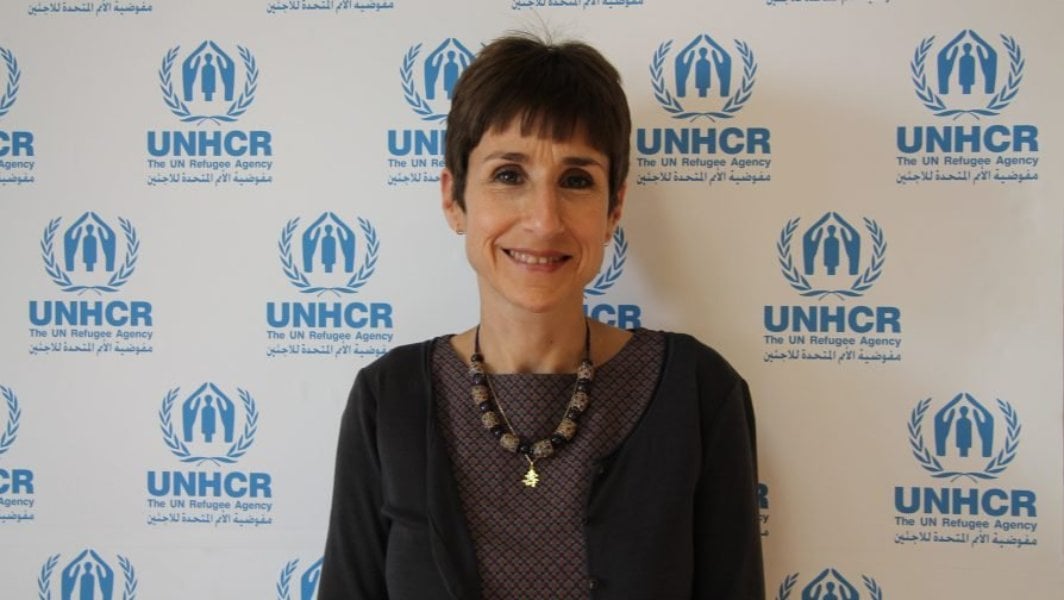Written by Theres
Published 20 June 2020
Lebanon continues to host the highest number of refugees per capita in the world, with over one million Syrian refugees. As many as 22% of refugee families in Lebanon are living in informal settlements and collective shelters across the country.
In an interview with UNHCR Representative in Lebanon, Mireille Girard, she explains the role of UNHCR in preventing the further spread of COVID19 and how we are seeking to protect refugee families during Ramadan and beyond.
- What is the current situation of the refugee population in Lebanon, especially refugees living in informal settlements, amid the economic challenges?
COVID-19 is a global health challenge, but also a massive humanitarian challenge. The economic impact of COVID-19 is most desperate and immediate for the most vulnerable communities, including refugees.
The situation of refugees in Lebanon – already hard hit by the economic crisis Lebanon is suffering from – has been further aggravated by the COVID-19 related confinement. The situation has had a severe impact on refugees’ access to livelihoods, and on their mental health, and ability to meet basic survival needs like rent, food, and medicine, as it is for vulnerable Lebanese communities.
Before the start of the economic crisis and the COVID-19 emergency in Lebanon, 73% of Syrian refugees were living below the poverty line, on less than $3.84 per day, while 55% were living below the extreme poverty line, on less than $2.90 per day. We estimate that now at least three-quarters of refugees in Lebanon live in extreme poverty.
Refugees in Lebanon are increasingly expressing that they consider the risk of starvation a greater and more immediate/real threat to their life than COVID-19. By late April, over 70% of refugees surveyed by UNHCR in Lebanon told us that they have difficulties buying food due to a lack of money and that they have had to reduce their food consumption in favour of their children.
More than half of refugees surveyed in late April reported having lost livelihoods, and as the situation continues to deteriorate, more and more refugees are having to go into further debt to pay for basic necessities.
This has meant that refugees have increased their appeal for help to both UNHCR and the media, pleading for urgent assistance, like for example, cash to cover rent and in-kind assistance particularly food, hygiene and sterilization items.
- How is UNHCR Lebanon responding to the current health crisis, the COVID19 outbreak? (Any preventive measures taken in regards to refugees?)
Since the start of the COVID-19 outbreak in Lebanon, UNHCR has been actively working with other humanitarian actors and the authorities to prevent the spread of the virus among refugees. We immediately started developing preparedness, prevention and response measures (three pillars of our strategy) to account for the health of refugee and Lebanese communities. 100% of the cost of testing and treatment for all refugee patients will be covered by UNHCR.
We have teams on the ground daily raising awareness about virus prevention, particularly in informal settlements and collective shelters where refugees live in bigger numbers, and distributing hygiene materials. To date, humanitarian agencies have collectively reached 100% of the population living in informal settlements and collective shelters (in 5,020 informal settlements and 441 collective shelters), and these efforts are ongoing.
UNHCR teams are working around the clock to contribute as much as possible to the national plan under the leadership of the Government. We are bringing into the country life-saving medical equipment and supplies. We are in the process of expanding 5 public hospitals. In total, UNHCR will cover the costs of 800 additional hospital beds and 100 additional ICU beds.
With regards to isolation units, UNHCR and partners are working to ensure that persons who need to self-isolate – regardless of nationality – and cannot do so at home, will have a place to go to. We are in the process of equipping and rehabilitating 7 isolation units across the country, in close coordination with the authorities.
- What kind of assistance is UNHCR providing to refugee families during this health crisis?
UNHCR’s multipurpose cash assistance programme has been in place since 2016 and reaches 33,000 of the most vulnerable refugee Syrian families (around 218,000 individuals) each month. Now more than ever, this assistance is a lifeline for refugee families to help mitigate the additional challenges they are facing and assist them in meeting their immediate needs like shelter and food.
Recognizing the severe impact of the crisis, UNHCR has introduced COVID-19 temporary cash assistance targeting 11,000 Syrian families and 500 families of other nationalities for May, June and July. In addition, UNHCR is, in consultation with WFP, procuring food & hygiene product parcels that are being distributed through local NGO partners to an initial 10,000 unassisted families in dire need.
- Can you please let us know, in your view, why is cash assistance important to refugee families and how is it impacting their lives?
Cash-based assistance is an effective and efficient modality to meet refugees’ basic needs, and both refugees and UNHCR value the dignity that cash assistance allows. Injecting cash into the local economy also support growth, and this is so important at the moment with the difficulties the country is facing. In this context, cash-based assistance serves as a viable and preferred alternative to in-kind assistance.
Cash assistance enables refugees to meet their essential needs such as shelter, food and medicine. It allows families to make choices of their own based on their individual needs and priorities. Families are able to withdraw cash from ATMs in Lebanon and afford the goods and services they need most.
For UNHCR, the COVID-19 response is about saving lives. The virus has no boundaries between people, between countries. Now’s the time to work together to join forces, join hands, to be here for each other and to leave no one behind.
